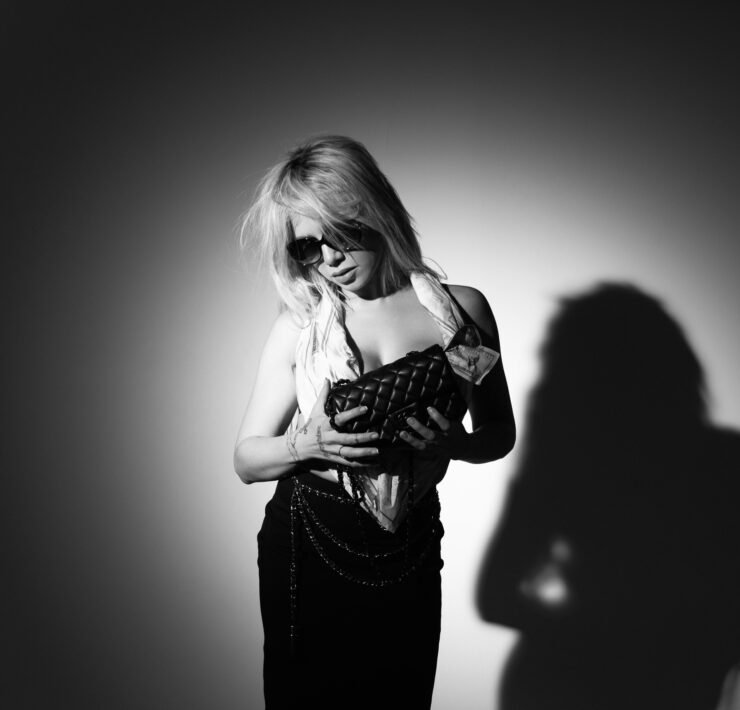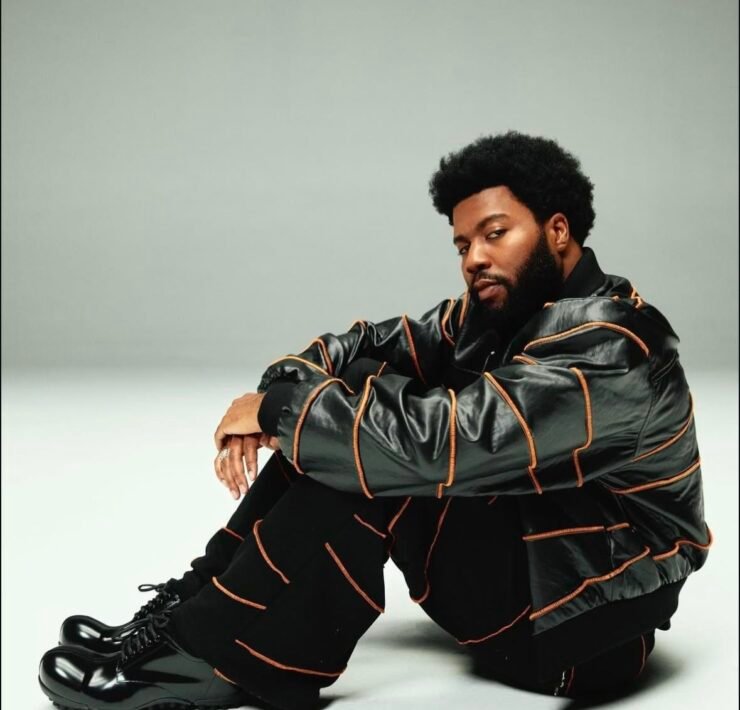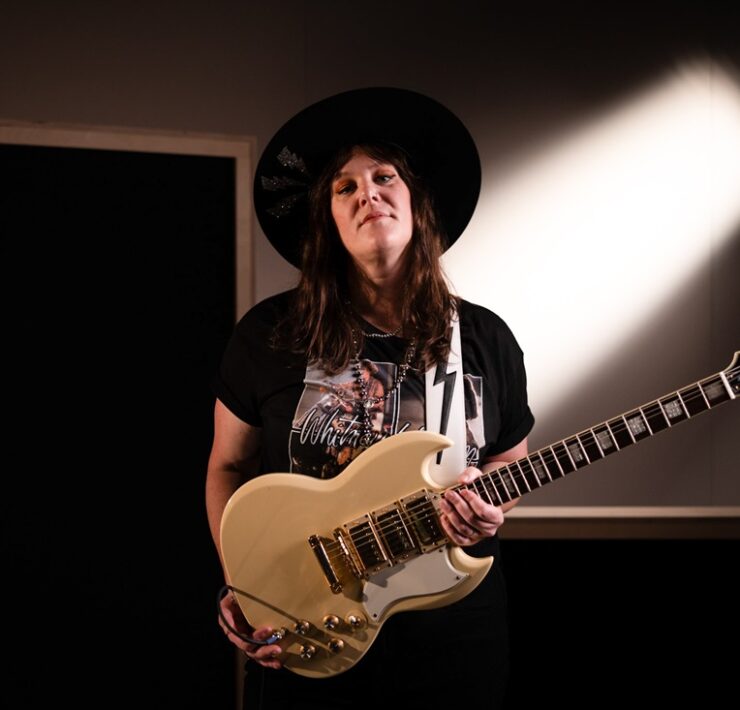Brian Falduto: From ‘School of Rock’ to Country Music Artist

Denny Patterson is a St. Louis-based entertainment and lifestyle journalist…
For Brian Falduto, fame came early.
At the precious age of 11, he was cast alongside Jack Black as Billy “Fancy Pants” in the hit film School of Rock and delivered one of the most iconic lines in cinematic history—“You’re tacky, and I hate you.” This was his first movie, and it made him an icon in the LGBTQ community.
Although the young actor walked away from Hollywood’s neon lights to pursue an education, performing always remained in his blood. In recent years, Falduto has stepped back into the limelight as singer-songwriter who delivers heartfelt lyrics through infectious melodies. His debut acoustic EP, Love One Another, was released in 2017 and broke the Top 100 Singer-Songwriter Albums on iTunes within 24 hours, and in 2020, he released his acclaimed hits “God Loves Me Too” and “Like a Wave.”
Now, the recording artist is venturing into the world of country music, a genre that was once deemed as extremely homophobic. Falduto’s new album, Gay Country, will debut to the world on March 10, and he has already released four singles–“Hottest Guy Here,” “Same Old Country Love Song,” “Big Boys Club,” and “Skip the Step.” All have received immense praise.
Falduto took some time to talk more about the album, how he wants to see wider representation in country music, and ways School of Rock is still making an impact, with OFM.
Let me begin by asking, how excited are you to release your upcoming country album, Gay Country?
I’m very excited! I’ve had these songs in my pocket for a minute, so to finally have them ready to go and roll out, that is so exciting. I want to share them with people.
The last couple times I’ve interviewed you, we’ve talked about your venture into music, but I was very surprised to learn that you were pursuing country. What made you want to go into this genre?
I grew up listening to country, and after I graduated college, I worked in country music radio for four years. I just fell in love with the genre and format, but when I was going through some shit at the time, I didn’t see myself reflected in these songs per se. They were speaking to me and resonating with me, but I was like, they’re not quite there. So, I started to try and write my own songs, and it was very fulfilling to sort of write down my emotions via song for the first time. I was kind of hooked after that.
I think for a while, I was trying to walk the line and not be too country and wanted to see where the music took me in a lot of ways. Then, with this project, I leaned into the fact of, hey, I love country music, so I let myself go there. Also, there’s not a bunch of queer representation in country music, so I wanted to sort of be bold about saying that there should be. I feel like the only way to do that with this project was to make it as country as possible, but also make it as clear as possible.

Yeah, the country music genre has not been the most inclusive when it comes to the LGBTQ community. Have you faced any major challenges?
I’ve recently gotten on TikTok, trying to keep up with the kids, and I’ll get some hateful comments like, “Don’t get your queerness on the country” and all these things, but honestly, it gets me more excited. For every hater, there’s a ton of people who are coming out of the woodwork being like, “Wow, I’ve been waiting to see myself in country music, and it’s so wonderful to have a song that I can relate to.” So, it’s worth it.
I feel like from an industry standpoint, mainstream country radio is not even the goal because mainstream country radio isn’t really partaking in this representation conversation in the way that I think that they should be, but what’s really cool is that because it’s 2023, everything’s streaming, and there’s social media like TikTok, there’s all these new lanes opening, so queer artists are filling those.
Country music is a big umbrella term, so we don’t necessarily need to be on the radio with the same format over and over. We can make it a more inclusive genre, even if the mainstream gatekeepers aren’t letting it be.
Like you said, we might have a couple haters here and there, but overall, I do feel that the views are changing.
Absolutely. I think what’s really cool about country music, especially queer country music right now, there’s a lot of great things happening, but I wanted to make a project that was similar to the sound I grew up on. Late 90s, early 2000s. Don’t get me wrong, I’m loving everything that everyone is doing in the queer country lane, but I wanted to keep that nostalgic feel.
Is there an overall story Gay Country is telling?
Kind of. The lead single sort of does that, “Same Old Country Love Song,” and I’m proud of that one because we’re trying to say that this is the same song you’ve heard a thousand times. We’re not saying there’s anything wrong with country music. We love country music! That’s why this album exists. I grew up on it, and I voted for Carrie Underwood on American Idol, like, 500 times, and I started watching the country music award shows. The project is taking a lot of country tropes and turning them on their head a little bit.
There’s a song that I’m really proud of on the album called “When Your Home Don’t Feel Like Home,” and that’s because in country music, there’s all these songs about how great your home town is, right? Sometimes, that’s not the experience when you’re growing up queer. You don’t feel like you belong, so we took something that everyone talks about in country music and attacked it with a queer angle.
You released a couple singles from the album already, your latest being “Skip the Step,” which came out last week. What can you tell us about this track?
That is such a fun track! Roll your windows down; crank-it-up vibes, but if you listen to the lyrics, it’s actually pretty sad. Its one of those where we tricked you into thinking it was a happy song, and it’s based on a conversation I had in therapy once. I was going through a relational ending, and it was painful, and I was doing everything I could to process that. I was meditating; I was journaling; I left town; I was talking to friends; I was going to therapy, all the things, but I couldn’t escape the pain. Then I was like, oh, I have to feel the pain. You can’t skip that step. You can’t just jump to processing and healing. You have to feel the hurt. So, that’s what this song is about.

Ultimately, what do you hope listeners take away from the album?
I want it to be for them what it was for me, which is just permissive, fun, and allowing. I think, especially in a genre like country music, it’s often about formula, perception, and fitting into a mold. With this project I allowed myself to just have fun and not pay attention to the rules. I hope while people are listening, they get that. That it feels familiar in a wonderful, nostalgic way because it’s a similar vibe to what they’ve heard, but we’re turning everything on its head. This will hopefully help them question the same concepts that I questioned while I was creating it.
You have credited the likes of Kacey Musgraves, Orville Peck, Brandi Carlile, and even Trixie Mattel as being some of your biggest influences. What are you going to do to open doors for more queer people to feel seen within the genre?
I think just by continuing to be as authentically visible as possible and lead by example, knowing that there’s a lot more diverse voices that need to be emerging in this genre. I hope that by owning my authenticity in this lane, people can see that and be like, oh, I can do that too. Then they’ll introduce their story. Country music at its heart is storytelling, and LGBTQ people have stories to tell. It’s crazy that there’s not more queer stories in country music. It’s built for it.
You also became a figurehead for the LGBTQ community after playing Billy “Fancy Pants” in School of Rock. Previously, you have talked about wanting to escape that image. Is that still the case?
Yeah, I feel like it’s fluctuated over the years. I want to escape the image sometimes. I remember once in college, someone came up to me and was like, “I heard you hate talking about School of Rock.” I was like, “Well, then why are you talking to me about it?” (Laughs). No, I don’t hate it. We’re about to come up on the 20-year anniversary. It’s different now. It’s not happening as much, but for a very long time, it was impossible for me to enter a social circle without being referred to as the gay kid from School of Rock.
To always have this pre-existing perception of you, it’s annoying, but at the same time, it’s such a talking point. Similarly to this album, I know that people watched my character on-screen when they were younger, and it allowed them to feel like they can be who they want to be. I don’t want to deny that part of the conversation because I think it’s important.
The representation conversation, and also the self-work I’ve done in order to be OK with that chapter of my life and the hardships it caused me afterwards. I think if I focus on the full-circle part of it, it’s kind of beautiful. I love talking about it now because of what it signifies, but my friends and I aren’t going to be talking about it on a Friday night, you know?
It was awesome to see that Jack Black gave “Same Old Country Love Song” some love on TikTok.
Yes! Not only did I luck out by being in this crazy, popular cult classic film, but the star of it is still supporting me all these years later. It’s unbelievable.

So, you believe the film is still making an impact on people and pop culture?
Yeah, I think so. From what I hear, I know it inspired a lot of kids to pick up instruments, and I think it aged well, which is hard to say about a lot of things from that time. I haven’t watched it in a while, but a friend watched it recently, and they were like, it really aged well! I can’t think of anything specifically that wouldn’t have aged well. My friend and I were also having a long conversation about how any movie can be a Christmas movie at Christmas time if it gives you the Christmas feels, and she said School of Rock is a Christmas movie to her. She watches it during Christmas time, and I was like, that’s crazy. This film has a life, which is wonderful.
What do you remember enjoying the most about filming?
I think the thing I enjoyed the most about filming was how close I became with the other classmates and how special those relationships were. We were doing something that no one does in the fifth grade, and (we were) having this unparalleled fifth grade experience where we were treated like stars every day and working hard at the same time. Things you don’t do as a fifth grader, and getting to skip school to go to set.
Similar to the representation conversation, there’s something tangible when we’ve all shared an experience. To have bonded with those people in that way, I remember going back to school afterwards, coming from this special, unique experience, I was like, OK, now what? There was something beautiful about that.
Are you still doing your podcast, The Gay Life Coach?
It’s on hiatus at the moment. The music stuff is taking up a lot of time, but I’m still writing blog pieces and putting those out. We’ll probably revitalize the podcast at some point.
What are some future goals you hope to accomplish with your overall career?
I’m just excited about the stuff that’s behind this. I’ve been working on these songs for a while, and they’ve been in my pocket for a while, and it’s always interesting when you release music because by the time you release it, you’re sort of already onto a different chapter of your life personally. I wrote these songs two or three years ago. I’m putting them out as if they’re me now, but they’re not really. They’re me two years ago.
I have stuff that I want to share already, so I’m honestly thinking, what’s the best way to package the next project while I’m also sort of putting this one out there? We’ve got a bunch of fun stuff lined up for festivals and Pride shows, so it’ll be a busy spring, and then hopefully I’ll get back to writing and recording in the summer.
Stay up-to-date and connect with Falduto by following him on Twitter, Instagram, TikTok, and Spotify @brianfalduto.
Photos courtesy of Dallas Riley
What's Your Reaction?
Denny Patterson is a St. Louis-based entertainment and lifestyle journalist who serves as OFM's Celebrity Correspondent. Outside of writing, some of his interests include traveling, binge watching TV shows and movies, reading (books and people!), and spending time with his husband and pets. Denny is also the Senior Lifestyle Writer for South Florida's OutClique Magazine and a contributing writer for Instinct Magazine. Connect with him on Instagram: @dennyp777.










